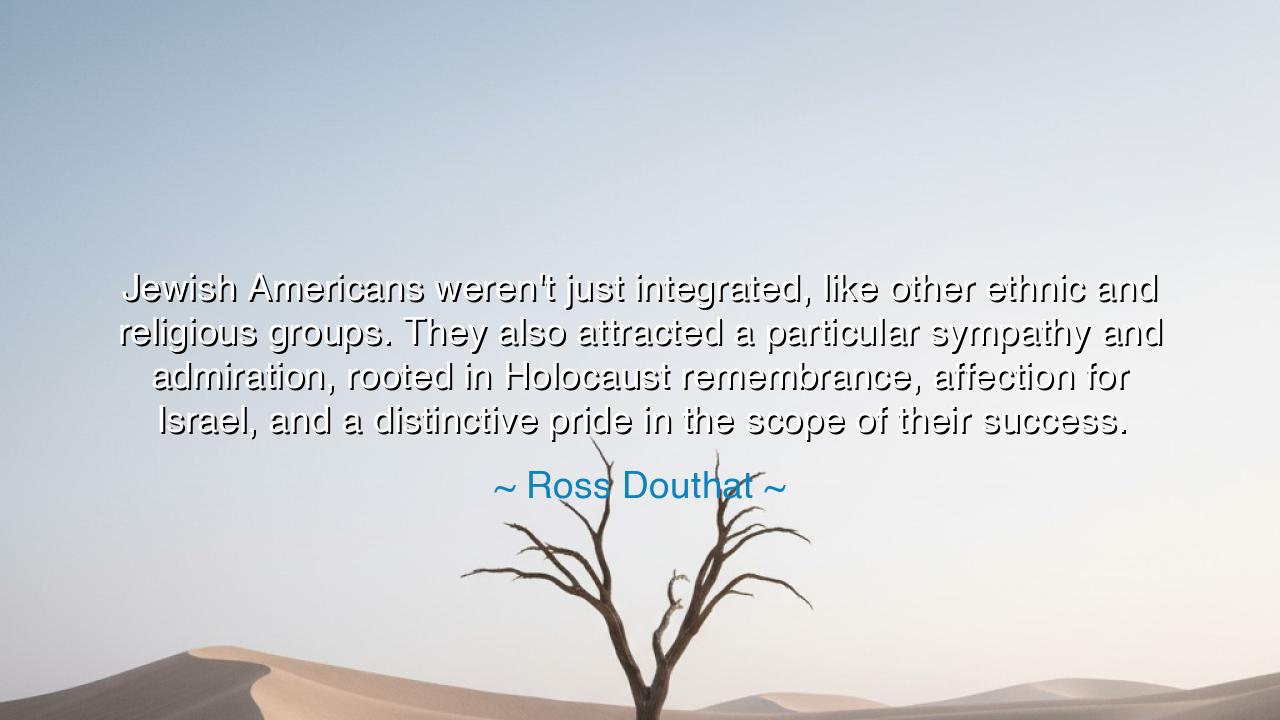
Jewish Americans weren't just integrated, like other ethnic and
Jewish Americans weren't just integrated, like other ethnic and religious groups. They also attracted a particular sympathy and admiration, rooted in Holocaust remembrance, affection for Israel, and a distinctive pride in the scope of their success.






Hear now, O children of the future, the words of Ross Douthat, who reflects upon the unique position of Jewish Americans in the tapestry of the United States: "Jewish Americans weren't just integrated, like other ethnic and religious groups. They also attracted a particular sympathy and admiration, rooted in Holocaust remembrance, affection for Israel, and a distinctive pride in the scope of their success." These words speak not only to the experience of Jewish Americans, but to the deep currents of history and human resilience that flow through them. For the Jewish people, their journey in America is not simply one of integration but one of extraordinary recognition—a recognition forged through tragedy, survival, and remarkable achievement.
In the ancient world, O children, the Jewish people were no strangers to struggle. For millennia, they wandered the earth, persecuted, exiled, and scattered among nations that saw them as outsiders. Yet, the Jewish people survived, and their spirit endured through centuries of hardship. They are as the phoenix, rising from the ashes of exile and destruction, each time stronger and more resilient. This resilience is evident in the very existence of the Jewish people today, as they thrive in the United States and across the world, a testament to their strength and determination. Their success in the face of unspeakable tragedy—the Holocaust, which nearly obliterated them—is a mark of divine perseverance and a powerful reminder of the strength of the human spirit.
The Holocaust, that dark chapter in human history, serves as both a tragic memory and a source of sympathy for the Jewish people. The affection for Israel—the return to their ancestral land after centuries of diaspora—is intertwined with this sympathy. It is not simply the success of Jewish Americans that commands admiration, but the fact that they have survived and flourished despite the horrors they have endured. Israel’s founding in 1948 was not only a political victory but a spiritual one, an affirmation that despite the trials of history, the Jewish people were capable of reclaiming their homeland. The admiration that Jewish Americans receive is thus rooted in a deeper respect for their ability to rise from the depths of tragedy to become an influential and successful people.
Consider, O children, the story of Anne Frank, a young Jewish girl whose diary became a symbol of the suffering of Jews during the Holocaust. Though Anne did not survive the war, her story transcended the darkness of her time. Her memory, her words, became a beacon of hope and a call to the world to remember and never forget the suffering of the Jewish people. Anne Frank’s life is not just a symbol of the past, but a testament to the ongoing journey of the Jewish people—one of survival, of remembrance, and of the triumph of spirit. Her legacy, like that of many Jewish Americans, reminds us that even in the face of unimaginable horror, the human will to succeed and thrive cannot be broken.
Douthat’s words also touch upon the pride that Jewish Americans take in their success, which is not merely personal, but a collective reflection of the strength and resilience of the Jewish people. This pride is not born out of arrogance, but from a deep awareness of the challenges they have overcome. The success of Jewish Americans in various fields—from business to science to the arts—is not just a sign of individual accomplishment, but a tribute to the perseverance of a people who were once oppressed but are now contributors to the fabric of society. Their success is a testament to their vision, their work ethic, and their unwavering belief in the possibility of a better future, no matter how dark the past may have been.
What then, O children, is the lesson to carry forward? Sympathy for others is not just an emotional response, but a recognition of the resilience and strength that others have demonstrated in the face of hardship. The Jewish people, with their remarkable history, teach us that even in the darkest times, hope and perseverance can lead to success and achievement. Their story is a reminder that tragedy does not have to define us; it is what we do with that tragedy, how we rise above it, that shapes our future. Just as Jewish Americans have built successful lives despite the obstacles they faced, so too can you, O children, overcome the challenges that stand in your way, with courage, hope, and determination.
In your own lives, remember this lesson: the greatest strength often comes from the greatest adversity. Sympathize with those who struggle, but also learn from their resilience. Understand that success is not only about what we achieve in the moment, but about how we rise after we fall. Empathy for others should fuel our actions, but we must also take pride in the strength we have within us to overcome obstacles. As you walk the path of your own journey, let the story of the Jewish people be a guiding light—a reminder that no matter how dark the road may seem, the human spirit has the power to rise, to build, and to thrive.






AAdministratorAdministrator
Welcome, honored guests. Please leave a comment, we will respond soon